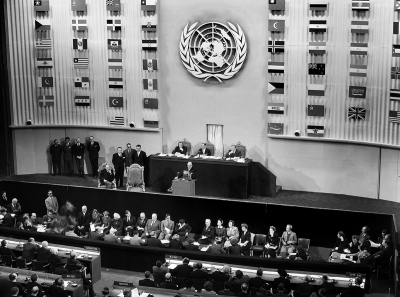Why the UN’s Universal Declaration of Human Rights is a powerful tool (part 2)

Last week, I discussed the origins of the “United Nation’s Universal Declaration of Human Rights” (UNUDHR) in FDR’s "Four Freedoms Speech" and the subsequent Atlantic Charter. The UNUDHR was laid on the foundation of the Anglo-American belief in human freedom as built up over a millennium of the development of the English Common Law, culminating in the American Declaration of Independence and the U.S. Constitution.
It should always be noted and remembered that the American Declaration of Independence declares that “all Men are created equal, that they are endowed by their Creator with certain unalienable Rights, that among these are Life, Liberty, and the pursuit of Happiness.”
The American Declaration does not merely declare that all Americans “are created equal” and endowed with “unalienable Rights,” but that all people are so created and so endowed.
Representatives from nations across the globe, under the leadership of U.N. leaders, composed the UNUDHR which was overwhelmingly approved as General Assembly Resolution 217A(III) on Dec. 10, 1948.
The Declaration concisely embraces the universal, all-encompassing assertion that every human being is “endowed” with these enumerated “universal Rights,” not just American citizens or British subjects.
That assertion by the U.N. of the universality of these basic human rights cannot be overestimated. The UNUDHR puts the U.N. General Assembly on record as proclaiming “a common standard of achievement” for all peoples and all nations “to the end that every individual and every organ of society, keeping this Declaration constantly in mind, shall strive by teaching and education to promote respect for these rights and freedoms … to secure their universal and effective recognition and observance, both among the peoples of Member States themselves and among the peoples of territories under their jurisdiction.”
The declaration’s “preamble” declares its premise quite simply and boldly: “recognition of the inherent dignity and of the equal and inalienable rights of all members of the human family is the foundation of freedom, justice and peace in the world.” The declaration’s 30 articles all deal with basic human rights, which Americans would assume as a basic human right. However, for people in large parts of the world, they are far more aspirational than experienced.
The UNUDHR’s importance as a basic universal standard to which each nation is expected to adhere has been an enormously powerful and influential weapon in the hands of human rights activists as they have engaged with governments across the globe.
For example, Article 18 declares:
“Everyone has the right to freedom of thought, conscience and religion; this right includes freedom to change his religion or belief, and freedom, either alone or in community with others and in public or private, to manifest his religion or belief in teaching, practice, worship, and observance.”
This particular article has been critically important and useful as religious freedom has come under increasing challenge and pressure in the world. As Christianity has been growing at exponential rates in parts of the second and third world where there have not historically been large numbers of Christians, the persecution of Christians has increased dramatically.
I had the honor and privilege of serving as a commissioner on the U.S. Commission on International Religious Freedom from 2001-2004 and 2005-2012. As we interacted with countries across the globe on issues of religious freedom, we constantly had to combat the idea that we were trying to impose American values concerning religious freedom on other countries.
Our reply was to note that our standard was the U.N. “Universal Declaration of Human Rights” of which their country was a signatory and that while we would wholeheartedly recommend the American system of separation of church and state as one which has produced more freedom of conscience for more people than any other national system yet devised, our standard is the Universal Declaration of Human Rights.
Under the Universal Declaration of Human Rights, a nation has the right to say that Islam, for instance, is the state religion and is given official and “favored” status in relation to other religions. What the UNUDHR does do, is insist that every individual in a country has the right “to change his religion or belief, and freedom, either alone or in community with others and in public or private, to manifest his religion or belief in teaching, practice, worship and observance.”
Many Islamic countries have had difficulty with this principle of changing one’s religion, but almost every Islamic country has signed the Universal Declaration, thus pledging themselves to this principle of freedom of conscience and religious expression.
I can bear witness from personal experience that the Universal Declaration of Human Rights has proven to be a powerful tool in the struggle for basic universal human rights and has been used to advance those rights to varying degrees in many countries around the world.
Dr. Richard Land, BA (Princeton, magna cum laude); D.Phil. (Oxford); Th.M (New Orleans Seminary). Dr. Land served as President of Southern Evangelical Seminary from July 2013 until July 2021. Upon his retirement, he was honored as President Emeritus and he continues to serve as an Adjunct Professor of Theology & Ethics. Dr. Land previously served as President of the Southern Baptist Convention's Ethics & Religious Liberty Commission (1988-2013) where he was also honored as President Emeritus upon his retirement. Dr. Land has also served as an Executive Editor and columnist for The Christian Post since 2011.
Dr. Land explores many timely and critical topics in his daily radio feature, “Bringing Every Thought Captive,” and in his weekly column for CP.



























